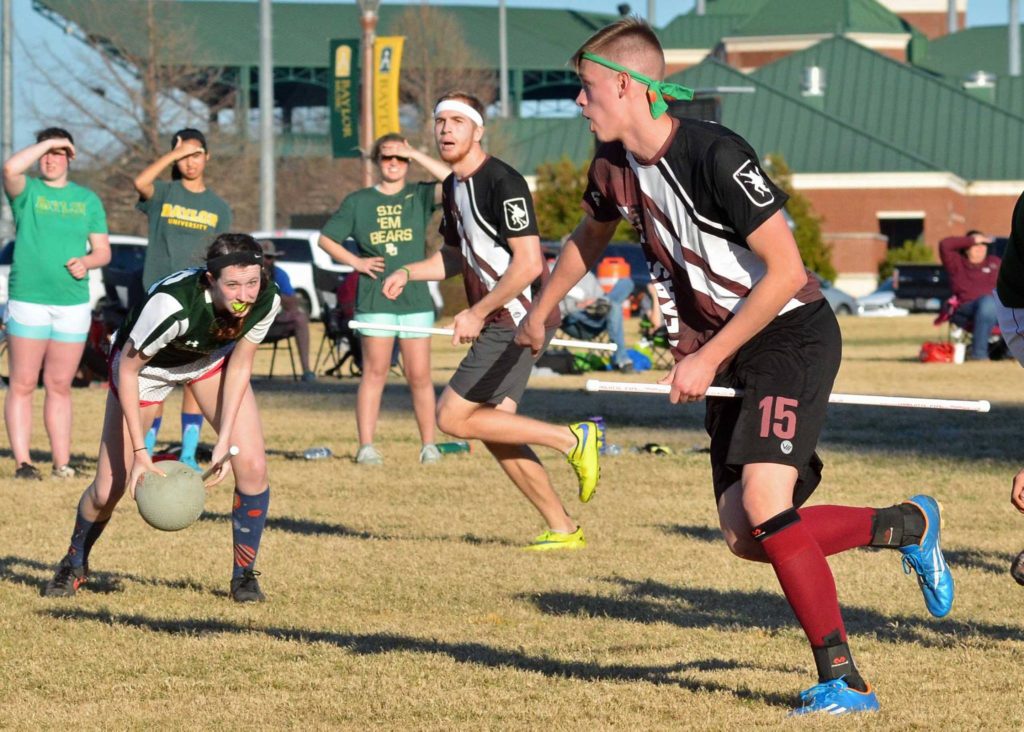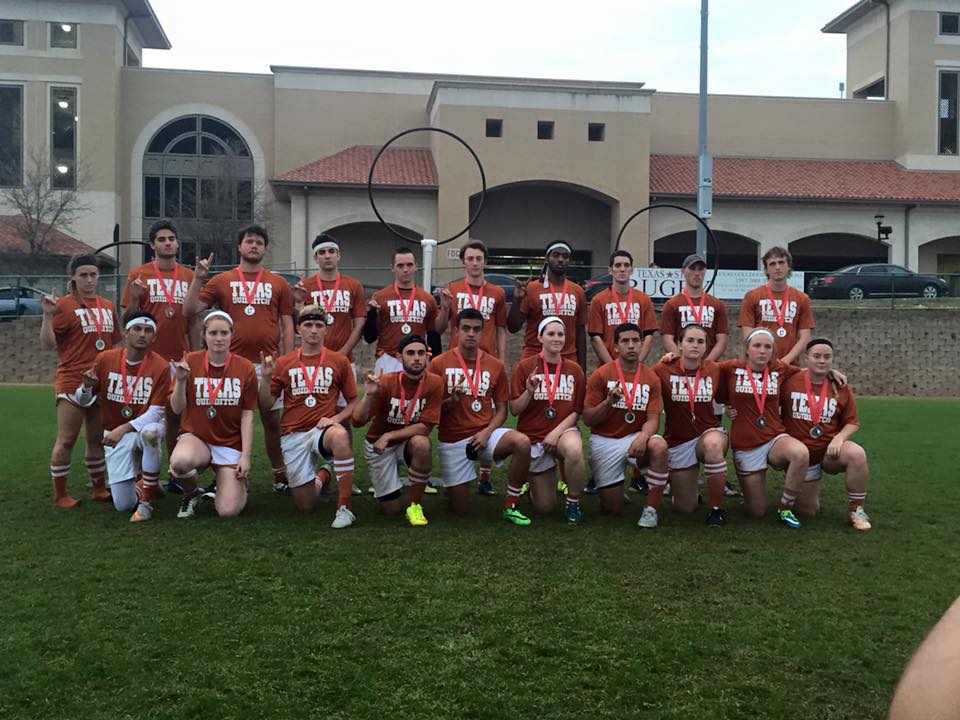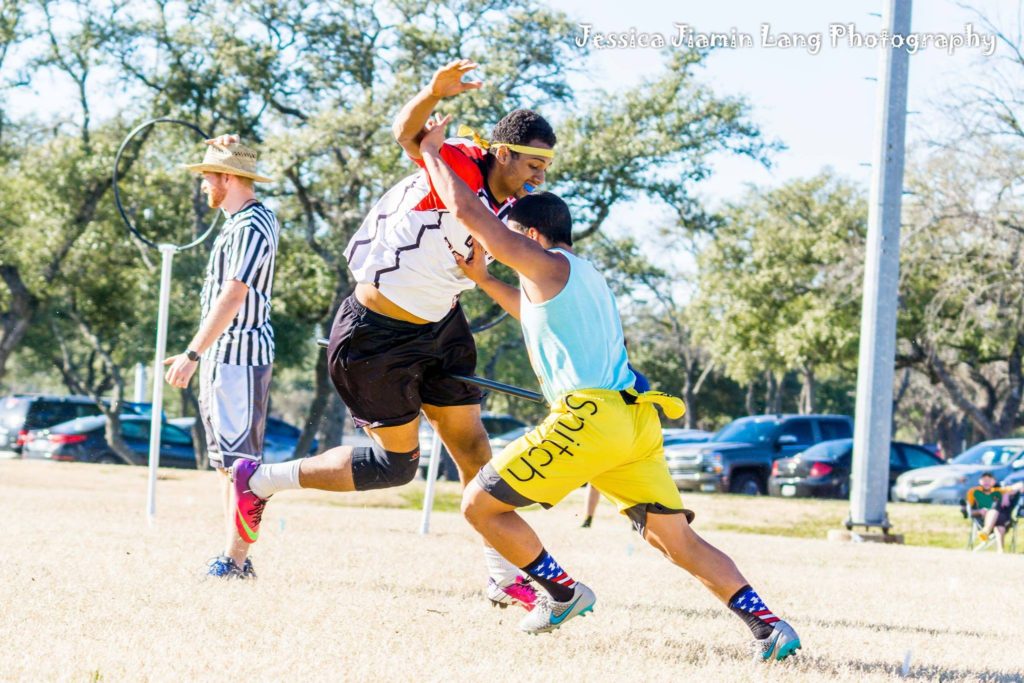Antwerp QC, Much of Belgian Core, Leaves Competitive Quidditch
The World Cup/US Quidditch Cup unpopular opinion article has become an time-honored tradition of ours here at The Eighth Man, with this marking the fourth edition of the feature. We pull in arguments from all across our staff, on everything from Cinderella runs to disappointing performances to the injury rates likely to be sustained. The only rule being that the argument should be against the grain of popular opinion.
Surprisingly, as farfetched as some of our prognostication has been at the time, our success rate is not half bad. That said, we’ve definitely wound up with some egg on our face at times–a prediction of a Lost Boys title at World Cup VII wasn’t our best–but, honestly, that’s part of the fun, to get people talking.
So please, enjoy the article, but don’t take anything as gospel. Discuss, argue and disagree, but don’t expect us to be batting 1.000. If we did, this would all be a whole lot less fun.
Texas A&M University is poised for a Final-Four run.
For two consecutive World Cups, The Eighth Man’s No. 9-ranked team entering the tournament has made a run to the Final Four. Emerson College did it at World Cup VII and the Lost Boys at World Cup 8. This time around, Texas A&M sits at lucky number nine, and the Aggies are incredibly well-equipped to make it for the third year in a row.
Almost all surprise Final Four runs in quidditch history have been built around a beater, and Texas A&M has a special one in Harris Coleman. Coleman brings elite athleticism to the position and uses his impressive speed and arm strength to press other offenses into oblivion. He also has a high win percentage in beater battles, leading to the maintenance of control for the squad. Combine him with teammate Daniel Sarbrazo in a two-male beater set, and it becomes very hard to score and almost impossible to get anywhere near the snitch. Yes, it takes more than a couple of players to make a deep run, and with key contributors in the quaffle game like Keegan Adlis and Clay Enderlin, the Aggies have that more.

Credit: Katie Stewart
All of that said, it’s not just the talent within the team that makes them great candidates for a Cinderella run, but the path they’ve been given to get one. Of the top-tier opponents Texas A&M could have drawn out of Pot One, the Los Angeles Gambits could be considered something of a gift. The Gambits are a methodical team that like to bide their time until the beater game has cleared out and their chasers can go to work. They have played three teams this season that have beaters noted for being ultra-aggressive – Quidditch Club Boston’s Max Havlin, Arizona State University’s Ryan McGonagle and Texas Cavalry’s Augustine Monroe – and are 1-3 in those games. If Coleman’s aggression can do enough to keep the game in-range, it’s anyone’s game, as Texas A&M holds a 4-5 SWIM record this season and the Gambits are just 3-6.
A win in their game against the Gambits should mean a win of their pool and, from there, the path to the Final Four should be clear. An easy Round-of-32 game, followed by a Sweet-16 game against another middling pool winner should give them a high chance at a quarterfinals run. After that, it’s simply all about matchups. While a game against one of the Southwest’s elites or Boston would likely be the end of the road, there are plenty of teams that the Aggies–at worst–would be slight underdogs against. And, that late in the day, with teams running on fumes, anything is possible.
– Tad Walters
University of Michigan will miss the Sweet 16 for the first time since World Cup VI.
On the surface, it seems like a landmark season for one of the nation’s proudest college programs. They didn’t just get over the annual hump of being knocked out of their regional championship by Michigan State University, they made a run all the way to their first regional championship title. They have much of the core from their Sweet 16 runs at World Cups VII and 8, just with more experience. And, for the first time ever, they’ve managed to maintain impressive standing in both the USQ and The Eighth Man rankings from start-to-finish, instead of their usual anonymous early season start.
The problem for this edition of the Wolverines is that, after years of following up poor falls with dominant springs, they seem to be doing the opposite. It’s not just the losses they’ve sustained, which include a snitch-range loss to UNC and a blowout defeat at the hands of Rochester United, but how anonymous their bludger game has looked doing it. Even in their best win of the spring, a snitch-range victory over Ball State University in the finals of “World Cup,” the Cardinals’ Tyler Walker dominated the pitch from end-to-end. Combine that with an offense that can’t seem to string any passes together in the half court and you start to see a clear recipe for a team begging to be upset at US Quidditch Cup 9. Sure, their physicality and athleticism will make scoring difficult for the opposition and net them a couple transition goals, but can we really expect them to be putting teams out of range game in and game out?
Not only has the spring been cruel to Michigan, but their Cup pool draw was as well. The Wolverines will have to take on an Oklahoma State University team that can match their athleticism, a Penn State University squad that can throw Scott Axel at them–a beater capable of having the same kind of dominant effect Walker and UNC’s Kyle Bullins managed against them–and a Tennessee Tech University team that is a complete enigma. While three losses and a pool play exit is unlikely, finding two defeats in those games is much easier, and would leave Michigan with a disastrous Round-of-32 matchup with a pool winner, few of which I’d expect them to be favored in.
Maybe the Wolverines will find that World Cup magic one more time, but the smart money says the well has finally dried up for a college side with so much promise.
– Ethan Sturm
A college team will win US Quidditch Cup 9.
This is not the year of the community team. For years analysts have been claiming that this is the year the community teams will overtake the college teams, and, once again, we will be wrong.
The current Eighth Man Top 20 has nine community teams ranked. Let us take a look at the state of the ones that have been touted as reputable. The Lost Boys are entering Cup with no depth or chemistry. Texas Cavalry has faced season-ending injuries and departures of key pieces. Lone Star, after coming up short so many times before, enters the main stage once again but with more holes than previously seen. The Gambits, much like their cross-city rivals, enter the main event with no depth and a slew of combative personalities. Then we have Boston. Possibly the best team since the World Cup VI rendition of Texas, this squad features high-level talent and the determination to practice regularly despite busy schedules. Of the community teams, this Northeast community team is the only one with a true shot at the title. But the fact remains that a college team, University of Texas, has a dynasty to their name and it doesn’t behoove anyone to bet against them.

Courtesy: Michael Duqette
Early season favors community teams as they only need to mesh styles of experienced players. College teams, however, face the challenge of training new recruits who may or may not have caught a previous glimpse of the game. Barring unexpected injuries, the growth of a college team is typically greater than any community team over the course of the season.
Call it an unpopular opinion, but I foresee the top 16 in The Eighth Man rankings coming out 6 and 10 in favor of college teams, with a college team taking home the title of US Quidditch Cup 9 champion.
– Anonymous
University of Texas is the clear US Quidditch Cup 9 favorite.
Somehow, we, as a community, have decided to officially dub the University of Texas an underdog entering US Quidditch Cup 9. Despite them having already won World Cup VII from the sixth spot in our site’s rankings, despite them following their annual pattern of a slow start and a Southwest Regional Championship loss and despite them proving they can play the most athletically-gifted team in the league to a virtual draw, we’ve decided that a bunch of community teams with no depth should be favored above them.
But the fact of the matter is this Longhorns team will win this tournament while almost not breaking a sweat.
The No. 1 seed is all but a given with the pool of life Texas drew, allowing them to play their backups, avoid injuries and enter Sunday morning about as fresh as they were at the beginning of the tournament, knowing that they won’t see another pool winner in the bracket until the quarterfinals. Meanwhile, teams like the Lost Boys and Boston will have to exert their starts in Saturday matchups, opening the door for tournament-changing injuries and tired legs. While other teams’ odds may drop over the course of the first day, the Longhorns will easily keep theirs the exact same.
Come the late rounds of bracket play–a point Texas is all but a lock for–they can enter each and every matchup with all of the confidence in the world. While the Gambits may have to play Boston with their Bat City blowout in the back of their minds, the Longhorns will either have a blank slate entering the match or the knowledge they can compete with the team, particularly after the results they managed against Texas Cavalry and Lone Star at the Southwest Regional Championship. With each successive round, the Alex Brownes, Tony Rodriguezes and Tyler Trudeaus will get a little more tired from playing huge minutes, while the Texas rotation will keep giving them the edge.
Years ago, Noah Schwartz and I came up with a formula for a World Cup champ. You have to have a game-changing beater, a top-notch snitch-on-pitch game and competent ball handling. You also have to be able to hit. The Longhorns can check off every point on the list, and with the easiest path to the title of any team, there is no reason to believe Texas will not be hoisting the trophy in the air for the fourth year in a row.
– Ethan Sturm
Seekers, take a seat.
Of the 200 games played in the flight stage of World Cup 8, a whopping 84 (or 42%) games ended up being in snitch range. A large number of the remaining games ended just outside of snitch range. This was a huge increase compared to World Cup VII, where of the 156 games played in pool play, 52 (or 33%) of the games were played in snitch range. Additionally, at World Cup 8, a single team (University of Texas) went undefeated in Swiss without a single game in snitch range (and even they had games that were within 40 quaffle points). In contrast, five entire teams (Texas, Boston University, Lone Star, Baylor University and the Lost Boys) from pool play ended up walking through their pools without ever playing a game in snitch range. Three of those teams (Texas, Lone Star and Lost Boys) didn’t play a game within 50 quaffle points, and two (Texas and Lost Boys) didn’t play a game within 100 quaffle points.

Credit: Jessica Jiamin Lang
Swiss play at World Cup 8 was bashed for several different reasons, but one thing cannot be denied: the excitement of the games in Swiss play was far, far better than in pool play. Expect to see similar things this year: a few pools will be closely contested and come down to snitch-range games, but most pools will see very little excitement. Several teams will coast into bracket play without ever having played a snitch-range game.
We’ll see some Swiss-induced nostalgia for many players following this tournament.
– Kevin Oelze
Archives by Month:
- May 2023
- April 2023
- April 2022
- January 2021
- October 2020
- September 2020
- July 2020
- May 2020
- April 2020
- March 2020
- February 2020
- January 2020
- December 2019
- November 2019
- October 2019
- August 2019
- April 2019
- March 2019
- February 2019
- January 2019
- November 2018
- October 2018
- September 2018
- August 2018
- July 2018
- June 2018
- April 2018
- March 2018
- February 2018
- January 2018
- November 2017
- October 2017
- July 2017
- June 2017
- May 2017
- April 2017
- March 2017
- February 2017
- January 2017
- December 2016
- November 2016
- October 2016
- September 2016
- August 2016
- July 2016
- June 2016
- May 2016
- April 2016
- March 2016
- February 2016
- January 2016
- December 2015
- November 2015
- October 2015
- September 2015
- August 2015
- July 2015
- June 2015
- May 2015
- April 2015
- March 2015
- February 2015
- January 2015
- December 2014
- November 2014
- October 2014
- September 2014
- August 2014
- July 2014
- May 2014
- April 2014
- March 2014
- February 2014
- January 2014
- November 2013
- October 2013
- September 2013
- August 2013
- July 2013
- June 2013
- May 2013
- April 2013
- March 2013
- February 2013
- January 2013
- December 2012
- November 2012
- October 2012
Archives by Subject:
- Categories
- Awards
- College/Community Split
- Column
- Community Teams
- Countdown to Columbia
- DIY
- Drills
- Elo Rankings
- Fantasy Fantasy Tournaments
- Game & Tournament Reports
- General
- History Of
- International
- IQA World Cup
- Major League Quidditch
- March Madness
- Matches of the Decade
- Monday Water Cooler
- News
- Positional Strategy
- Press Release
- Profiles
- Quidditch Australia
- Rankings Wrap-Up
- Referees
- Rock Hill Roll Call
- Rules and Policy
- Statistic
- Strategy
- Team Management
- Team USA
- The Pitch
- The Quidditch Lens
- Top 10 College
- Top 10 Community
- Top 20
- Uncategorized
- US Quarantine Cup
- US Quidditch Cup
